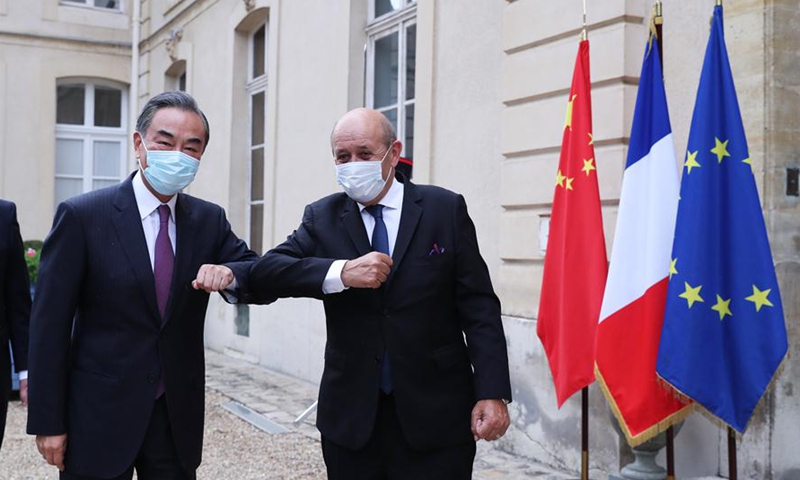China’s diplomacy reboots offline in Europe
By Wang Yiwei Source: Global Times Published: 2020/8/30 16:56:03

Visiting Chinese State Councilor and Foreign Minister Wang Yi (L) touches elbows with French Foreign Minister Jean-Yves Le Drian in Paris, France, Aug. 29, 2020. (Xinhua/Gao Jing)
China's diplomacy has restarted offline from fresh meetings with European leaders. Chinese State Councilor and Foreign Minister Wang Yi is in a visit to European countries, namely Italy, the Netherlands, Norway, France and Germany. After Wang's trip, Yang Jiechi, a member of the Political Bureau of the Communist Party of China Central Committee and director of the Office of the Central Commission for Foreign Affairs, is expected to visit Myanmar, Spain and Greece.
Why is China planning so many frequent visits to Europe?
There are more than 23 million worldwide cases of COVID-19, leading to the worst global recession since the World War II. The world is facing more uncertainties and instabilities. The US is pursuing unilateralism and being a bully that seeks to maintain a hegemonic position. This seriously imperils the international order and undermines unity and cooperation at a dire moment for humanity.
Some American politicians, for their own interest, are trying to preach a "new cold war" and are deliberately creating geopolitical tensions. They are inciting the world to "decouple," which is clearly not in line with the fundamental interests of the people of all countries.
Under these circumstances, China is more than willing to strengthen communication with its European partners, coordinate policies and jointly cope with global challenges. Between China and Europe, cooperation overwhelms competition while consensus outweighs conflict. China has always supported the process of European integration, and is more than happy to see the European Union maintain unity and prosperity. It should be clear that China and Europe are not institutional competitors, but long-term comprehensive strategic partners. As two major forces, markets and civilizations, China and Europe obligated to work together to strengthen international solidarity against the pandemic, uphold multilateralism, construct post-pandemic world order and jump-start the world economy.
It can be said that Wang's visit to Europe is meant to "disinfect" the erroneous claims US Secretary of State Mike Pompeo made during his recent trip to Europe. Wang's visit is not simply about neutralizing negative impacts from the US, but also aiming to promote effective communication with European partners in the future.
China-Italy cooperation against COVID-19 can be a much-told tale. The Netherlands is playing a special role in European economic recovery and its attitude toward Huawei is of concern to China and the US. France and Germany are the core countries of the EU. Wang's visit is also regarded as a preparation for the China-EU video summit that Berlin has been working on and might happen on September 14.
As for Norway, the last time a Chinese foreign minister visited there was 15 years ago, so the main message of this trip is: Beijing is willing to work with Oslo to promote cooperation in vaccine R&D and production, establish a mechanism for maritime cooperation and dialogue and accelerate negotiations for a bilateral free trade agreement. The aim with Oslo will be to ultimately protect the free trade system and be more open to each other.
We can see that Wang's visit aims to stabilize the global industrial and supply chains in response to the COVID-19 pandemic and call for multilateralism and globalization. China is willing to enhance the integration of the Belt and Road Initiative with the Netherlands and work together to open fast maritime transport channels between the Port of Rotterdam and Chinese ports.
Currently, Europe has a "watch and wait" attitude toward the US election, but it also doesn't expect much from the US under a Biden administration. Europe is concerned that it will no longer be at the center of the world stage, which gives China an opportunity to persuade the continent from engaging in a US-led new cold war. Both China and Europe emphasize strategic autonomy and their interests converge as they reject the new cold war and refuse to sacrifice their legitimate rights and interests for the sake of US hegemony.
This year is an important year for China-Europe relations as it marks the 45th anniversary of the establishment of diplomatic ties. Both sides will work to conclude negotiations for a China-EU investment agreement by the end of this year. They will deepen dialogues and cooperation on economics and trade, climate change, green development, digital economy and pandemic fight. There are also many more channels for contestation with the summit of 17 Central and Eastern European countries with China (known as 17+1), and China-EU summit.
The author is Jean Monnet chair professor and director of the Center for EU Studies at Renmin University of China. opinion@globaltimes.com.cn
Posted in: VIEWPOINT